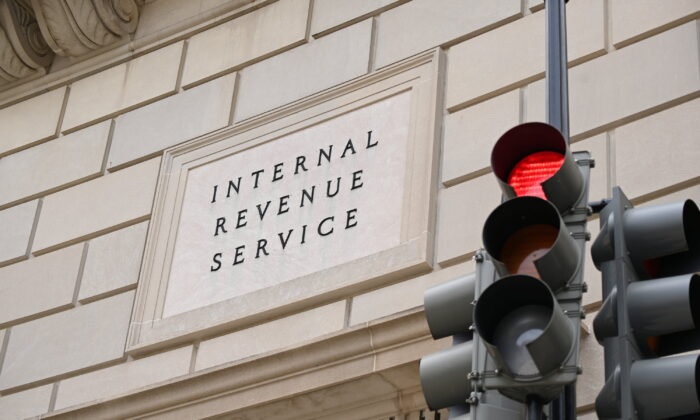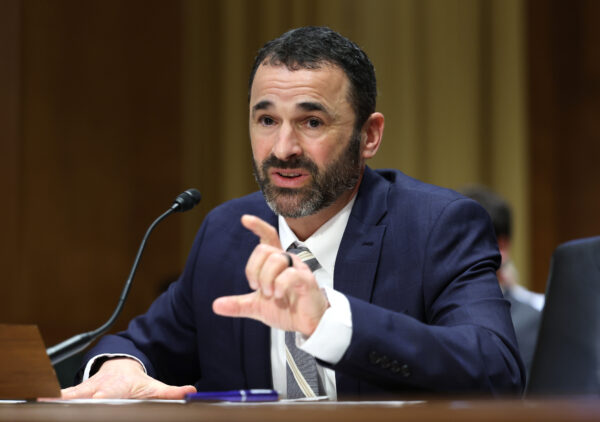
The IRS building is seen in Washington on Sept. 28, 2020. (Erin Scott/Reuters)
The IRS is planning to spend tens of billions of dollars to audit wealthy taxpayers and corporations, according to the agency’s strategic operating plan released on April 6.
“People who get W-2s or Social Security payments or have a small business should not be worried about a sudden new wave of IRS audits,” IRS Commissioner Danny Werfel told reporters on April 6 about the agency’s plans. “We’re taking that off the table. Our focus will be on other high dollar areas for quite some time because there’s a lot of work to do in those more complex areas of tax law that will take years to accomplish.”
Instead, tax agents will target “taxpayers with complex tax filings and high-dollar noncompliance,” according to the IRS operating plan (pdf), It will use more than half of the $80 billion that it received in new funding, or $47.4 billion, to enhance enforcement efforts.
Some Republicans have suggested that the money from the Democrats’ climate change and health care bill passed last year would help create a number of new armed auditors who would harass middle-class taxpayers. Werfel told The Associated Press that it won’t include spending for new agents with guns.
Republican House lawmakers voted to claw back some of the $80 billion after they retook the lower congressional chamber. However, that bill likely won’t prevail in the Democrat-controlled Senate.
No hiring boost is foreseen for the criminal investigation unit, which represents 3 percent of the agency’s workforce and employed roughly 2,077 special agents as of the 2022 budget year, according to the IRS’ annual report. Those are the agents who may be armed.
There are “no plans to increase” that division, according to Werfel.
“That will stay at its current rate,” he said.

“We have years of work ahead of us where we will be 100 percent focused on building capacity for higher-income individuals and corporations,” Werfel told reporters. “During this time, the audit rate for average taxpayers will not increase, and as a result, we will not come close to hitting or exceeding any historic average rate.”
However, the IRS plan doesn’t provide a detailed breakdown of the $80 billion spending package over the next 10 years. The agency stated that the plan will be updated annually and that it will adjust its hiring plan.
“Pursuant to Treasury’s directive, small businesses and households earning $400,000 or less will not see audit rates increase relative to historical levels,” the plan reads, without defining what the historical levels are. “We will increase our focus on segments of taxpayers with complex issues and complex returns where audit rates are minimal today, such as those related to large partnerships, large corporations, and high-income and high-wealth individuals. Modern data analysis tools can greatly streamline these efforts.”
During the 1990s, the overall percentage of tax returns that were audited was about 1.67 percent, while in 2021, the overall audit rate stood at 0.4 percent. If the IRS returns to auditing Americans at “historical levels,” there could be a significant uptick in audits in the coming years. Nowhere in the IRS’s operating plan does it define what “historical levels” may entail.
“We don’t want to be locked into numbers on a piece of paper,” Deputy Treasury Secretary Wally Adeyemo told The Wall Street Journal on April 6.
Also in the plan, the IRS stated that it’s seeking to modernize systems and allow taxpayers to securely file all documents and respond to IRS notices online. The agency also wants to implement a system that would allow taxpayers to identify possible mistakes before they file their taxes rather than waiting weeks or months for the IRS to respond, delaying potential refunds.
The agency stated that more than 10 million taxpayers have past-due balances on their taxes. Upcoming changes include making it easier to target repayment options and make those payments, according to the report.
Last month, the Senate confirmed Werfel to serve as the head of the IRS by a vote of 54–42. One Democrat, Sen. Joe Manchin (D-W.Va.), voted against him, while six Republicans broke ranks and voted to confirm his nomination.
“While Daniel Werfel is supremely qualified to serve as the IRS Commissioner, I have zero faith he will be given the autonomy to perform the job in accordance with the law and for that reason, I cannot support his nomination,” Manchin said in a statement at the time.
The Associated Press contributed to this report.
No comments:
Post a Comment